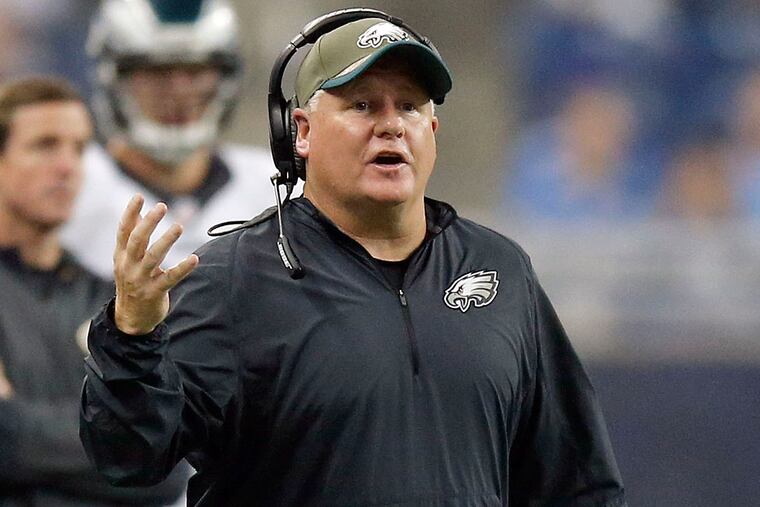Eagles' fatal flaw: time of possession
Thanks partly to Chip Kellys up-tempo offense, the Eagles defense is on the field too much and is wearing down.

CHIP KELLY employs a team chiropractor, a sports psychologist and a director of sports and science re-conditioning, whatever that might be. Sounds fascist.
What he really needs is a staff geologist.
From "The Wave" in Arizona to "The Stacks" in Italy, a world traveler like Kelly must have encountered remarkable sights sculpted from rock. A Renaissance man with a passion for knowledge, Chippah must have wondered how these edifices came to be.
Most grade-school students could promptly educate him: It is, of course, erosion.
This phenomenon occurs when wind and water combine with the most important element: time. Subjected to this combination even the mightiest mountains will dwindle.
Remarkably, despite his scintillating intelligence and his vast stores of knowledge, Kelly seems to have missed class on Erosion Day.
How else can you explain the way he runs his defense - that is, runs it into the ground.
For the second year in a row, Kelly's "Machine Gun" offense has eroded his defense. Even when the offense works, it works too fast. The defense never gets enough rest.
For the second year in a row, the Eagles rank last in time of possession.
After 11 games the defense has been on the field for about 83 more minutes than the offense. There are 60 minutes in a game. Considering the units ideally should at least split the time - 30 minutes apiece - this means the Eagles' defense has so far played nearly an extra three games more than the offense. That will grow by season's end. Just like last season.
Well, you said you wanted an 18-game schedule . . .
Since his arrival, Kelly has dismissed concerns that his defenses would erode. He posited that, if his up-tempo offense worked, then it would remain on the field long enough to rest the defense; and, if the offense worked, the defense usually would be playing with a lead. This, in his beautiful mind, is somehow an easier task than playing in close games or blowouts.
The offense hasn't worked much - but, realistically, even when it did work well, the defense wore out.
The Kelly Theory is based on the number of plays played; that in any given game, if the teams' plays are equal, they should be equally fatigued, right?
No; not equally. Closer, but not equally.
If the Eagles' defense plays 5 minutes more than the other team's and plays the same number of plays, it's not as if the Eagles' defense spent the down time relaxing on the sideline. They were still on the field. Still working. Still thinking.
The "plays = plays" argument might have sounder logic, too, if every defense played against a maniacally up-tempo scheme every week. Then, the erosion would be equal.
It is not.
The simple solution, of course, is to play maniacally up-tempo less frequently; play up-tempo when the defense is fresh. The beginning of halves; after a defensive three-and-out. Just use common sense.
This is an intuitive conclusion; and, over three seasons, an empirical one.
The Eagles had a chance to reach the playoffs in Game 15 last season but in Games 13 and 14, against Seattle and then Dallas, the defense played an average of 23:51 more than the offense. It also played against mercilessly physical offenses built around brutally punishing running games.
Little wonder, then, in Game 15 against an abysmal Washington team, the defense collapsed in the second half.
In the last four games this season, the defense has been on the field about 36 minutes more than the offense. They are 1-3, and the one win, at Dallas, required overtime.
The defense has collapsed the past two games.
Again: Little wonder.
It is worn to a nub.
Three seasons into the Chip Kelly experiment has shown this, if nothing else:
No defense can withstand this sort of strain through 16 games.
This might work with a virtually unlimited number of players available for college games, especially given the lesser size, slower speed and unmatched resilience of men ages 18 to 23 who play a dozen games, most of them blowouts, thanks largely to the Pac-12's toothless schedule and the effectiveness of Kelly as an offensive whiz.
However, when limited to about 16 front-line defenders who are bigger, faster and closer to 30 than they are to 20, it simply fails.
Too few bodies.
Too much time.
Blog: ph.ly/DNL